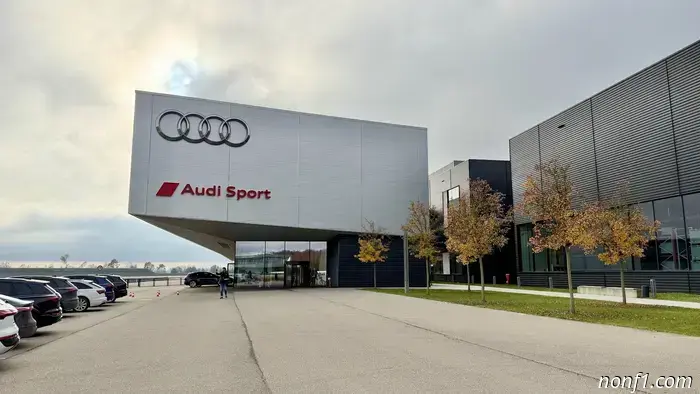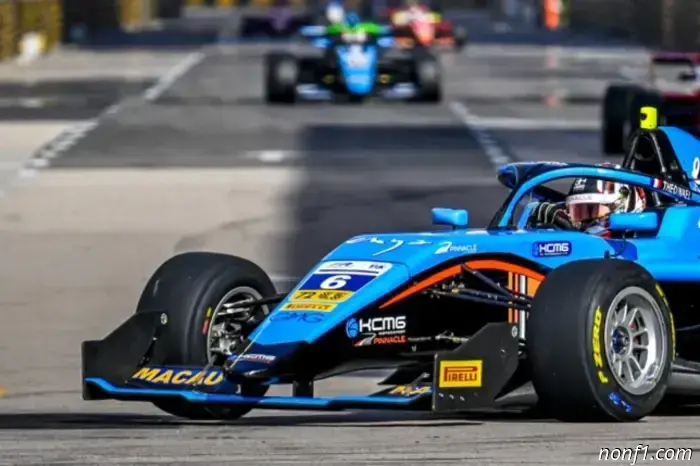
Development of the 2026 Audi F1 car has already ceased, with the team now concentrating on the 2027 and 2028 models.
The latest updates and reviews in the automotive world, no nonsense.
Our complimentary daily newsletter delivers the most significant stories straight to your inbox every weekday.
The Audi Formula 1 Team has yet to complete any laps in pre-season testing and hasn't even shipped containers to the Australia Grand Prix, but it has already stopped work on its 2026 drivetrain.
During a visit to the newly expanded Audi Sport facility in Neuburg, Germany, where the internal combustion and electric components for the new F1 power unit are produced, The Drive discovered that although the team is under pressure to prepare for its inaugural race, its 430 employees are mainly concentrating on plans for the team's second and third years in the series.
“Development of the 2026 drivetrain has finished, and we are now shifting our focus to 2027 and 2028,” said Audi F1’s Chief Technology Officer Stefan Dreyer to The Drive. “In Formula 1, component development never truly ceases, but given the limited data available to us from the current Sauber and Ferrari setup and the 2026 regulation changes, we are already looking beyond our first year.”
Dreyer clarified that, although Audi has acquired Sauber and most of its assets, the intellectual property of the drivetrain remains solely with Ferrari, and no data is shared with Sauber or Audi. He referred to this setup as a “Chinese wall,” indicating that all data collected by the team from previous seasons is kept separate from the new drivetrain group. Even if shared, it’s uncertain how valuable that data would be given the upcoming regulations.
When asked how engineers could work on improvements without any actual test data from real track conditions, Dreyer acknowledged the difficult position they are in. He explained that they are depending on simulator testing and will clearly be working overtime as the cars begin to accumulate mileage in Spain at the end of January, followed by testing in Bahrain in mid-February.
I inquired about what the Neuburg team would concentrate on now that the 2026 development is finished, and Dreyer simply stated, “manufacturing.” The team will need to prepare essential components in advance of the demanding season that starts in January with pre-season testing and concludes in December with the Abu Dhabi Grand Prix.
The Neuburg facility has been operational for a while but has recently undergone a significant and costly remodel and expansion to support the new F1 operations. Dreyer guided a select group of media through the complex; however, similar to most racing assembly facilities, photography or recording was strictly prohibited. What I can share is that after visiting Ferrari's Gestione Sportiva in Maranello (F1 HQ) and McLaren's Technology Center in Woking, I can affirm that Audi’s facilities are top-notch and have seen no expense spared.
Dreyer did not provide a specific figure for the investment in Neuburg, joking that he “did not want to think about the number.” However, that evening, when I posed the same question to Audi AG’s finance chief, the response was “a three-digit-million amount.”
Have a tip? Email us at [email protected]







Otros artículos
 Daniil Kvyat sigue siendo más rápido que un coche autónomo.
En el autódromo Yas Marina tuvo lugar una carrera de exhibición, en la que los organizadores demostraron al público el progreso alcanzado en el campo de la inteligencia artificial aplicada al automovilismo...
Daniil Kvyat sigue siendo más rápido que un coche autónomo.
En el autódromo Yas Marina tuvo lugar una carrera de exhibición, en la que los organizadores demostraron al público el progreso alcanzado en el campo de la inteligencia artificial aplicada al automovilismo...
 El desarrollo del monoplaza de F1 de Audi para 2026 ya se ha detenido, «ahora se centran en 2027 y 2028»
La nueva unidad de potencia de Audi no ha dado ni una sola vuelta en un circuito, pero más de 400 ingenieros ya están trabajando duro para mejorarla de cara a las próximas temporadas.
El desarrollo del monoplaza de F1 de Audi para 2026 ya se ha detenido, «ahora se centran en 2027 y 2028»
La nueva unidad de potencia de Audi no ha dado ni una sola vuelta en un circuito, pero más de 400 ingenieros ya están trabajando duro para mejorarla de cara a las próximas temporadas.
 Théophile Naël won the Macau Grand Prix, held this weekend for the 72nd time on the classic street circuit often compared to Monaco but considered even more challenging.
The French Pinnacle Motorsport driver crossed the finish line just 0.250 seconds ahead of Mari Boya, his teammate who finished last Formula 3 season third in the standings. Also on the podium was 17-year-old Enzo Deligny, who is due to make his debut in F3 with Prema Racing next season.
Unlike yesterday’s qualifying race, today’s Macau Grand Prix was rich in incidents, and Naël only took the lead after the fourth period when the safety car was deployed.
From pole started Freddie Slater, a Prema driver, but he was overtaken by Mari Boya at the first corner, and the Briton had to fend off attacks from Naël, who had started the race third. R-ace GP driver Deligny took advantage of the situation and managed to pass Théophile.
Taito Kato, a Japanese driver competing under a French license for ART, misjudged his speed entering the Lisboa turn and collided with Mattia Kolnagi of PHM Racing, after which a pile-up of several cars formed in the next corner and the safety car was deployed.
On the restart Slater managed to overtake Boya and build a three-second gap to the field, but on lap nine at the same Lisboa turn Oscar Wurz could not avoid contact with the barriers.
Another restart was given on lap 11, and Mari Boya was determined to fight back, attacking Slater on the exit of Mandarin. Freddie fought desperately but could not keep the car on track and hit the barrier in the final corner. His race was over and the safety car was again deployed — this time on lap 12 of 15.
Théophile Naël spent almost the entire distance trying to attack Deligny, but Enzo was able to hold his position. On the final restart, given on the penultimate lap, both drivers ran close behind Mari Boya, who after Mandarin repelled the attack from the R-ace GP driver but was powerless against Naël, who passed both and took the lead.
So he only headed the race right at the finish, but that no longer mattered. Théophile became the winner of a very prestigious junior event, which will bring the 18-year-old driver additional attention. He already has a contract with Campos Racing, however, and will continue racing in Formula 3 next season.
Teófilo Naël ganó el Gran Premio de Macao, que este fin de semana se celebró por 72.ª vez en el clásico circuito urbano...
Théophile Naël won the Macau Grand Prix, held this weekend for the 72nd time on the classic street circuit often compared to Monaco but considered even more challenging.
The French Pinnacle Motorsport driver crossed the finish line just 0.250 seconds ahead of Mari Boya, his teammate who finished last Formula 3 season third in the standings. Also on the podium was 17-year-old Enzo Deligny, who is due to make his debut in F3 with Prema Racing next season.
Unlike yesterday’s qualifying race, today’s Macau Grand Prix was rich in incidents, and Naël only took the lead after the fourth period when the safety car was deployed.
From pole started Freddie Slater, a Prema driver, but he was overtaken by Mari Boya at the first corner, and the Briton had to fend off attacks from Naël, who had started the race third. R-ace GP driver Deligny took advantage of the situation and managed to pass Théophile.
Taito Kato, a Japanese driver competing under a French license for ART, misjudged his speed entering the Lisboa turn and collided with Mattia Kolnagi of PHM Racing, after which a pile-up of several cars formed in the next corner and the safety car was deployed.
On the restart Slater managed to overtake Boya and build a three-second gap to the field, but on lap nine at the same Lisboa turn Oscar Wurz could not avoid contact with the barriers.
Another restart was given on lap 11, and Mari Boya was determined to fight back, attacking Slater on the exit of Mandarin. Freddie fought desperately but could not keep the car on track and hit the barrier in the final corner. His race was over and the safety car was again deployed — this time on lap 12 of 15.
Théophile Naël spent almost the entire distance trying to attack Deligny, but Enzo was able to hold his position. On the final restart, given on the penultimate lap, both drivers ran close behind Mari Boya, who after Mandarin repelled the attack from the R-ace GP driver but was powerless against Naël, who passed both and took the lead.
So he only headed the race right at the finish, but that no longer mattered. Théophile became the winner of a very prestigious junior event, which will bring the 18-year-old driver additional attention. He already has a contract with Campos Racing, however, and will continue racing in Formula 3 next season.
Teófilo Naël ganó el Gran Premio de Macao, que este fin de semana se celebró por 72.ª vez en el clásico circuito urbano...
 Gran Premio de Las Vegas: Pronóstico meteorológico preliminar
El pronóstico preliminar para el Gran Premio de Las Vegas promete tiempo seco y frío durante el fin de semana de carreras.
Gran Premio de Las Vegas: Pronóstico meteorológico preliminar
El pronóstico preliminar para el Gran Premio de Las Vegas promete tiempo seco y frío durante el fin de semana de carreras.
 Hülkenberg: La relación con el coche ya es algo mejor.
A mediados de la temporada, los resultados en clasificación de Nico Hülkenberg eran claramente peores que los de Gabriel Bortoleto, debutante de la temporada, pero ahora el panorama ha cambiado...
Hülkenberg: La relación con el coche ya es algo mejor.
A mediados de la temporada, los resultados en clasificación de Nico Hülkenberg eran claramente peores que los de Gabriel Bortoleto, debutante de la temporada, pero ahora el panorama ha cambiado...
Development of the 2026 Audi F1 car has already ceased, with the team now concentrating on the 2027 and 2028 models.
Audi's new F1 drivetrain has yet to complete a lap on a track, but more than 400 engineers are already diligently working to enhance it for upcoming seasons.
